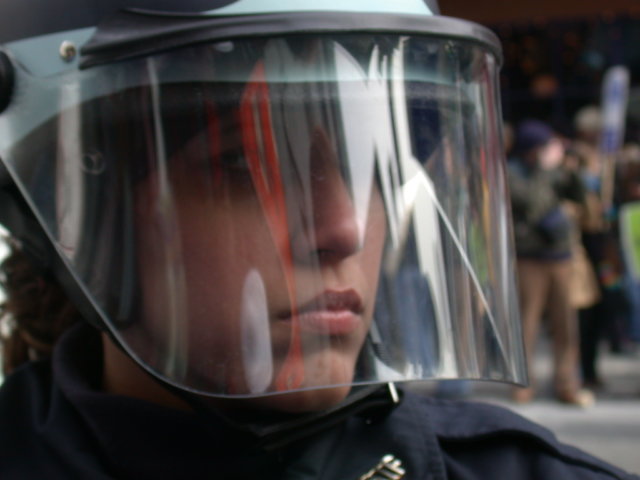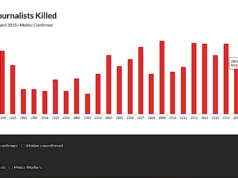
Darkness is descending upon the land. A wall has been erected between fellow men. We are at an ideological impasse as a nation; at loggerheads spiritually, emotionally and politically.
Much of this has to do with the process of confirmation bias, wherein people only consume news and opinions that reflect and strengthen their own personal views on disparate matters — a political or religious echo chamber, if you will. This creates an atmosphere of intolerance and insensitivity to the views of others outside our prescribed groups.
The echo chamber becomes particularly dangerous when a steady diet of hateful, xenophobic or misogynistic ideas are ingested. Where there is a total lack of compassion, hate is able to take root. Discrimination against entire groups of people becomes normalized.
Always a message in all news
As a child, I remember watching the end of a news cast. As the credits rolled, I saw who directed and produced the show, who wrote it, etc. This all struck me as odd, because I, like many people, naively believed that the news was merely an objective report on the truth. Over time, I began to realize that news programs, newspapers, magazines and other instruments of mass media operate within a framework or an agenda to sway popular opinion one way or the other.
There’s an old country saw that says if you find a turtle on a fence post, it didn’t get there by itself. In other words, there is always a message in all news. Cultural mores and prescriptions are couched into language and communicated in every news broadcast, whether liberal or conservative. This is not necessarily propaganda, but it should be kept in any reader’s mind as he or she ingests morning news over coffee.
Dominant narratives tend to sway opinions
We saw this in the anti-Jewish screeds in Austria and Germany preceding the two world wars. The Holocaust and the attendant eugenics program would have been impossible without the vast amounts of literature that justified Nazi Germany’s quest for more lebensraum. Polemics against Jews were weaponized, especially against the so-called Ostjuden.
Stalinist Russia also deported many Jewish people while consigning many others to hard-labor camps. Anti-race thinking accompanied the trans-Atlantic slave trade. Enlightenment notions of beauty based on Greek ideals combined with the pseudo-sciences of phrenology and physiognomy to argue against the humanity of black, brown, yellow, red and other nonwhite peoples. Lavater, Blumenbach, Gall, Linnaeus, Voltaire, Hume, Kant and many others lent their intellectual credence to the idea that non-white people were subhuman.
We see this in today’s atmosphere as well: There is a wellspring of media outlets that seek to control the dominant narrative in America. For conservatives, Fox News, Breitbart and The Drudge Report are just a few of the more well known brands. The Daily Stormer, Stormfront and David Duke’s website may be a bit more obscure, but they are just as impactful (if not more so) for their intended audiences.
This by no means lets the liberal off the hook, either. One cannot merely read The Atlantic, listen to NPR or scroll Huffington Post and consider one’s self well-rounded concerning the days’ events. I encourage left-leaning readers to peruse the opinion sections of papers like The Grand Junction Sentinel or the Tulsa World, for instance, to get an idea of what other people have to say about a particular subject. It is important for left-leaning folks to consider opposing views as well.
An example
We can see an example of a gulf between liberal and conservative media as they discuss poverty. The conservative argues that it is only the impoverished people’s morality that has led them to their condition. It is not up to the government to fix their problems. The liberal will argue, meanwhile, that governmental and structural changes need to be made to help solve poverty, but they may ignore an impoverished person’s series of ethical lapses.
A more nuanced approach would suggest that the government can help the poor in the way of job training, mental health facilities and drug addiction-recovery programs, but the impoverished people must strive to eliminate gambling, alcoholism and criminal proclivities from their daily lives.
Of course, there are no easy, one-size-fits-all solutions to a problem as thorny as poverty, but staking out a camp on one side without considering the other is counterproductive. Discuss ideas with other people. Find out why they believe the way they do. Examine why you believe and cherish the things you hold dear. You may find that some things are worth keeping, while others need to be replaced or abandoned outright.
Reason, rationale should guide our dialogue
The point in seeking out varied news sources is to further dialogue. We are faced with an increasingly complex and disjointed world. Mere talking points and shouting past one another will not suffice. That usually devolves into the type of violence we saw in Charlottesville.
The point of diverse media exposure is to create an informed, impassioned relationship with what is being debated while also realizing that valid points can be made by two opposing schools of thought. When we do this we are better equipped to engage with other people in a more reasoned and rational basis. Also, we realize that they are not our enemy.





















